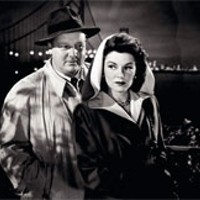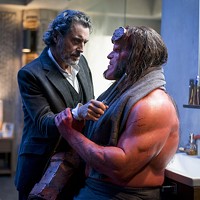

CONTROVERSIAL CLASSICS COLLECTION (1932-1964). A better title for this rock-solid DVD compilation might have been Contemporary Classics Collection, as every movie in this set tackles a thorny issue that's still alive and kicking in modern American society. Racial injustice, mob mentality, political gridlock, media manipulation - plus ca change, plus c'est la meme chose...
Paul Muni, an Oscar-winning Golden Age superstar who's been forgotten by time (except perhaps as the original Scarface), delivers one of his finest performances in I Am A Fugitive From a Chain Gang (1932), which was based on autobiographical material by real-life chain gang escapee Robert E. Burns. Muni plays a World War I vet whose attempts to start a new life instead find him wrongly arrested for burglary and sentenced to 10 years of hard labor; the demoralizing treatment he receives makes him determined to escape from his dire predicament. Banned in Georgia (where Burns had been incarcerated) and so successful that it led to penal reforms, this film refuses to pull punches - meaning viewers better be prepared for that knockout of an ending.
Like I Am a Fugitive, Fritz Lang's Fury (1936) also looks at a man wrongly imprisoned for a crime he didn't commit. Here, it's Joe Wheeler (Spencer Tracy), whose planned rendezvous with his fiancee (Sylvia Sidney) is interrupted when he's hauled off to a small-town slammer by officers who think he might be part of a kidnapping outfit. Convinced that a hardened criminal is sitting in their town's jail - and equally convinced that the law will go easy on him - the citizens decide to storm the prison and mete out their own brand of justice. This was Lang's first American movie, and it's a fine companion piece to his earlier German film M: Whereas that 1931 classic was more ambiguous in its depiction of mob justice (what viewer wasn't pleased when the criminal underground captured the child killer?), this one clearly shows the dangers of vigilantism.
Despite having helmed two of the most enduring popcorn pictures of the 1960s, The Great Escape and The Magnificent Seven, John Sturges' only Best Director Oscar nomination came for the imaginatively staged Bad Day at Black Rock (1955), which also earned nods for star Spencer Tracy and scripter Millard Kaufman. Tracy stars as a one-armed stranger who arrives in the Western town of Black Rock in the days following World War II; he's searching for a Japanese-American farmer but instead runs afoul of local yahoos menacingly played by Robert Ryan, Lee Marvin and Ernest Borgnine. Few sights in this world are as beautiful as watching rednecks get their comeuppance, and Tracy's stubborn vet is determined to take care of business in this tight (81 minutes) thriller that boldly (and atypically) alluded to the poor treatment of Japanese-Americans during and after the war.
Warfare of a different sort is featured in the explosive Blackboard Jungle (1955), whose greatest claim to fame is that it was the first film to include rock & roll music (Bill Haley's "Rock Around the Clock" is played during the opening and closing credits). Reliable Glenn Ford is cast as the idealistic teacher whose new post at an inner-city school tests both his values and his patience as he's confronted by students more interested in rape and robbery than test scores and perfect attendance. Vic Morrow is suitably surly as the toughest of the kids, though it's magnetic Sidney Poitier, as a cocky student who matures under Ford's tutelage, who makes the strongest impression.
My vote for the best film in this collection goes to A Face In the Crowd (1957), director Elia Kazan's brilliant look at a guitar-strumming country boy who becomes a media sensation through careful grooming. "Discovered" by a well-intentioned journalist (Patricia Neal), "Lonesome" Rhodes (Andy Griffith in a spectacular performance) not only becomes the star of his own hit TV series but also finds himself being wooed by politicians seeking to tap into that populist groove. A shady character from the start, Rhodes isn't corrupted by his newfound power as much as it serves to bring out his true self: petty, scornful and condescending. Not until Robert Redford's Quiz Show had a movie so clearly illustrated the power of the idiot box - in this case, its ability to mold the minds of susceptible Americans who will swallow anything that passes before their eyes. So if nothing else, the film can be seen today as a warning about the evils of FOX News.
Based on Allen Drury's Pulitzer Prize-winning novel, Advise and Consent (1962) finds director Otto Preminger guiding an all-star cast through a sprawling drama that looks at political wheeling and dealing. Though he doesn't rack up the most screen time, Henry Fonda receives top billing as the President's controversial nominee for Secretary of State, a man suspected by some of having once dallied with the Communist Party. The Commander in Chief (Franchot Tone) and the Senate Majority Leader (Walter Pidgeon) work around the clock to insure his confirmation, but members within their own party, such as the curmudgeonly Senator from South Carolina (Charles Laughton, in his cinematic swan song), are just as determined to block his appointment. Scattershot events are packed so tightly into the screenplay that it's inevitable some will eventually get dropped, but the film nevertheless makes for compulsive viewing.
Finally, The Americanization of Emily (1964) is a black comedy about a cowardly naval officer (James Garner) who's chosen by his superior (Melvyn Douglas) to film the D-Day invasion firsthand, in effect increasing the chances that the first man to die at Normandy will be from the Navy (thereby elevating that military branch's profile). Julie Andrews co-stars as a reserved war widow who thaws in Garner's presence, while James Coburn spices the proceedings as his gung-ho confidante. Arthur Hiller's prosaic direction softens Paddy Chayefsky's biting screenplay (what Stanley Kubrick or Blake Edwards could have done with this material!), yet the project's cynicism toward war is never in doubt, particularly during a standout monologue in which Garner explains why it's the general populace - rather than the military leaders - who deserves the blame for the enduring popularity of wars.
All the movies in this collection include audio commentary with film scholars or filmmakers; the exception is A Face In the Crowd, which features a new documentary on the making of the picture. Other scattered extras include theatrical trailers and various shorts.
I Am a Fugitive From a Chain Gang: ***1/2
Fury: ***1/2
Bad Day at Black Rock: ***1/2
Blackboard Jungle: ***1/2
A Face In the Crowd: ****
Advise and Consent:***
The Americanization of Emily: ***
Extras: **1/2
- Matt Brunson





